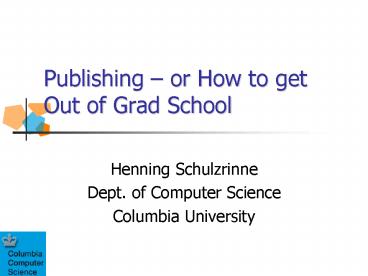Publishing - PowerPoint PPT Presentation
1 / 25
Title:
Publishing
Description:
Publishing or How to get Out of Grad School Henning Schulzrinne Dept. of Computer Science Columbia University – PowerPoint PPT presentation
Number of Views:82
Avg rating:3.0/5.0
Title: Publishing
1
Publishing or How to get Out of Grad School
- Henning Schulzrinne
- Dept. of Computer Science
- Columbia University
2
Publications
- Different kinds of publications
- Think like a reviewer
- Finding the right conference
- Advertising your work
- Paper types
- What if my paper is rejected?
3
Publication types
- Technical reports
- Workshops
- Conferences
- Magazines
- (Archival) Journals
- RFCs
4
Finding out about conferences
- CFP call for papers
- Finding out about conferences
- http//www.cs.ucsb.edu/almeroth/conf/stats/
- TCCC announcement list (subscribe!)
- Wenyu Jiangs conference list
5
Technical Reports
- CS, IBM and BL TR
- avoids being scooped
- present additional details (simulation results,
proofs, implementation details) - Can be used to advertise on mailing lists read
more often than some conference papers
6
Workshops
- Two kinds
- invited (Dagstuhl)
- topic-focused (Internet Measurements, NANOG)
- Smaller, more focused than conferences
- May not have formal proceedings, just copies of
slides - Often, only once or twice, but some for years
(ComSoc) - Selectivity varies from 100 to 10
- Some events are called workshop, but are really
conferences (NOSSDAV, IWQoS)
7
Conferences
- Hundreds a year
- Traditional ICC, Globecom
- Semi-traditional Infocom, SIGCOMM, ICNP,
Sigmetrics, Usenix, SOSP, - Newer WWW, NOSSDAV, IWQoS, SAINT, Mobicom,
Mobihoc, - Submission size 5-10 pages
8
Conferences
- Some have short submissions (extended abstract)
and longer accepted papers - Some are effectively the same length (Infocom)
- Few have long submissions and shorter final papers
9
Conference reviews
- Either technical program committee (TPC) or TPC
external reviewers - Reviews
- blind (most IEEE conferences) author doesnt
know reviewer, but reviewer knows author identity - double-blind (ACM) only the chair knows the
author identities
10
Finding the right conference
- Appropriate conference
- layer/topic area
- style (analysis, system)
- selectivity
- location (Australia vs. NY)
11
Traveling to conferences
- Many larger conferences have student travel
grants - often for authors
- sometimes for non-authors (SIGCOMM)
12
Magazines
- Examples
- IEEE Network Magazine
- IEEE Communications Magazine
- IEEE Personal Communications
- IEEE Multimedia Magazine
- Large circulation -gt topics of broad interest
- Written for non-specialist (30,000 readers!)
- Originality not always most important
13
Journals
- Every PhD thesis should result in at least one
journal publication - Archival most libraries have them and keep them
forever - Long review cycle
- Selectivity varies greatly can be less
selective than some conferences - Often, given second chance resubmit with major
changes
14
Journals
- Issued principally by
- Societies
- ACM
- IEEE
- Commercial publishers
- Springer Verlag
- Kluwer
- North Holland
15
Journals
- Examples
- IEEE/ACM Transactions on Networking
- Journal on Selected Areas in Communications
- Computer Communications Review
- ACM Multimedia
- Computer Networks
- Journal of High Speed Networks
- Journal of Communications and Networks
16
RFCs Internet Standards Documents
- RFCs are not papers (and vice versa)
- Can take a while, particularly for
standards-track documents - Start with submitting Internet Drafts but most
Internet drafts never make it to RFC - Specification vs. description
17
RFCs
- Precision vs. novelty and performance
- How does it work vs. how is this better than
existing work - Good way to get impact
- Good for industrial job interviews
18
Ways to advertise your work
- Technical reports
- Put link and abstract on web page (search
engines!) - Relevant mailing lists (e.g., end2end)
- Send pointer to authors of work that is closely
related - arXiv for tech reports
19
Finding related work
- netbib
- citeseer
- web pages of well-known network research groups
- Digital Library, IEEEXplore
20
Types of papers - content
- Measurement
- measure performance of real systems
- test bed or real Internet
- careful statistics how representative is your
data? - Analysis of existing algorithm
- TCP, FDDI, DQDB, RED, - not some obscure
protocol - simulation or analysis
- bad protocols are good news for authors
21
Types of papers, contd.
- System description
- implement interesting system
- describe it in sufficient detail
- whats new and interesting?
- prototype, not industrial product
- New algorithm or protocol
- switching, routing, scheduling,
- performance evaluation
- highest risk/reward
- dont describe bit fields
22
Think like a reviewer
- Reviewers are volunteers
- Reviewers are not English editors
- Abstract and title have to ensure proper routing
of paper (theory vs. systems) - Reviewers get mad if their work is not cited
- Clearly state what your contribution is (and
state other things in future work)
23
Think like a reviewer
- Sufficient detail to evaluate, but not used gcc
1.2.3 on a SPARC Ultra 10 called snoopy to
simulate - Repeat main results in introduction and summary
- Very carefully distinguish from prior work
- Avoid overloading one paper (hard!)
24
Paper submission
- Technical report (and RFCs) do no harm
- Basic rule cannot submit same material to two
venues simultaneously (including conference and
journal) - Dont explore LPU
- Conference paper refined(workshop paper
detail) - Journal paper refined(? conference papers)
25
What if a paper is rejected?
- Dont jump off the GWB - it happens to everyone
- If not, youre not submitting to the right
conferences - No point complaining if the reviews are
superficial decisions are effectively final
(except for discoveries of plagiarism, etc.) - Publish as tech report immediately (after taking
reviews into consideration)































